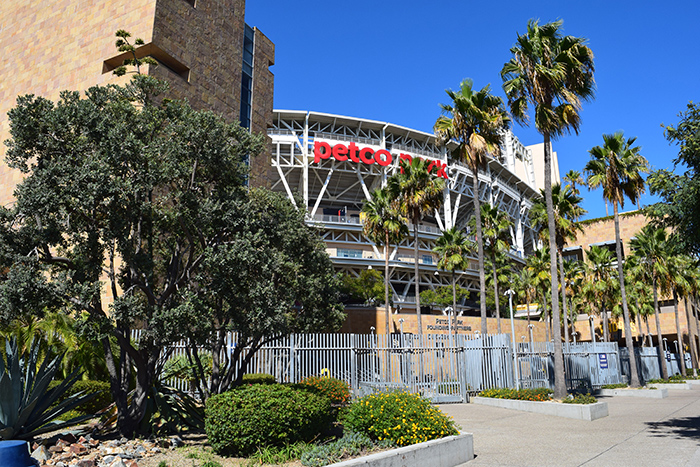
Schlepping and Schmoozing Along the Interstate 5, Chapter 20, Exit 15A (J Street): Petco Park
Turn left at the bottom of J Street exit ramp and left again on J Street. Proceed to 10th Street and follow it to Petco Park
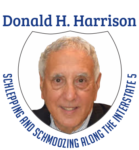
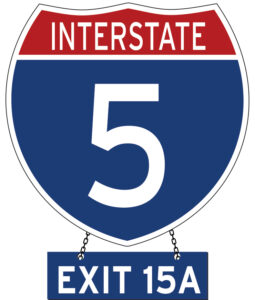 Petco Park has been the home of the San Diego Padres baseball team since 2004, which was the 35th year of the National League expansion team’s existence. Since the team’s induction into Major League Baseball in 1969 until 2021, the Padres counted 11 players and two coaches on its rosters who had at least one Jewish parent. In 2022, Bob Melvin became the team’s first manager with a Jewish parent. For the first 35 years, the team played at Qualcomm Stadium, previously known as San Diego Jack Murphy Stadium, in Mission Valley.
Petco Park has been the home of the San Diego Padres baseball team since 2004, which was the 35th year of the National League expansion team’s existence. Since the team’s induction into Major League Baseball in 1969 until 2021, the Padres counted 11 players and two coaches on its rosters who had at least one Jewish parent. In 2022, Bob Melvin became the team’s first manager with a Jewish parent. For the first 35 years, the team played at Qualcomm Stadium, previously known as San Diego Jack Murphy Stadium, in Mission Valley.
Although none of the following awards were won while Padres, the high caliber of some of these Jewish players is indicated by the fact that while playing for other teams during their careers, three (Brad Ausmus, Jason Marquis, and Ian Kinsler) were All-Stars; two (Ausmus and Kinsler) were Gold Glove winners, and four (Marquis, Ausmus, Craig Breslow, and Kinsler) were on the rosters of teams that competed in the World Series. Additionally, Larry Rothschild served as a coach in two World Series. Bob Melvin on three separate occasions was honored by Major League Baseball as a manager of the year.
Five of the players competed on Israeli teams in the build-up toward the international tournaments known as the World Baseball Classic: Ausmus, Breslow, Kinsler, Marquis and Cory Decker. Under Israel’s “law of return,” anyone with Jewish parentage can become an Israeli citizen or, as in the case of these five baseball players, hold dual citizenship.
All eleven players have at least one Jewish parent. Other Jewish Padres (or perhaps we should call them the Avot, the Hebrew word for ‘Fathers’) were pitcher Dave Roberts (1969-1971); outfielder Dick Sharon (1974-1975); pitcher Steve Rosenberg (1991); infielder David Newhan (1999-2000); pitcher Aaron Poreda (2009); and pitcher Robert Stock (2018-2019).
Besides Larry Rothschild, the other Jewish coach who served the Padres was Norm Sherry (1982-1984). While a Los Angeles Dodger, Sherry set a record of sorts on May 7, 1960, when he served as catcher for his brother Larry Sherry, a pitcher. They were the first Jewish batterymates who were brothers. Norm Sherry also is credited with helping to tame Dodger pitcher Sandy Koufax’s wildness.
In an interview with Hillel Kutler of the Jewish Baseball Museum, Sherry related that during a 1961 Spring-training game against the Minnesota Twins, Koufax walked the first three batters. Sherry, visiting him on the mound, suggested that he not try to throw the ball so hard, but simply put it across or near the plate, and let the Twins try to hit. “I went back behind the plate,” Sherry continued. “Good God! He tried to ease up, and he was throwing harder than when he tried to. We came off the field, and I said, ‘Sandy, I don’t know if you realize it, but you just now threw harder than when you were trying to.’”
In alphabetical order, here are some highlights of the careers of Ausmus, Breslow, Decker, Kinsler, Marquis, Rothschild, and Melvin.
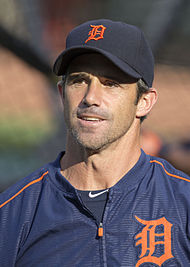 Brad Ausmus – A catcher, in 1993, Ausmus was one of five players with a Jewish parent who made their major league debuts in the uniform of the San Diego Padres – the others being Newhan (1999) Breslow (2005), Decker (2015), and Stock (2018). Ausmus’s 18-year major league career as a player began with a little more than three seasons as a Padre (1993-1996) and proceeded with one season with the Detroit Tigers (1996) two with the Houston Astros (1997-1998), two back with the Tigers (1999-2000), eight with the Astros again (2001-2008) and two final seasons with the Los Angeles Dodgers (2009-2010).
Brad Ausmus – A catcher, in 1993, Ausmus was one of five players with a Jewish parent who made their major league debuts in the uniform of the San Diego Padres – the others being Newhan (1999) Breslow (2005), Decker (2015), and Stock (2018). Ausmus’s 18-year major league career as a player began with a little more than three seasons as a Padre (1993-1996) and proceeded with one season with the Detroit Tigers (1996) two with the Houston Astros (1997-1998), two back with the Tigers (1999-2000), eight with the Astros again (2001-2008) and two final seasons with the Los Angeles Dodgers (2009-2010).
Clearly, baseball owners in San Diego and Detroit were impressed with him over the time he played for their teams because San Diego hired him as a field executive in the front office for the 2011-2013 seasons and Detroit entrusted the job of manager to him from 2014 through 2017. That made him one of seven Jewish managers in MLB history, joining the likes of Lou Boudreau, Gabe Kapler, Bob Melvin, Jeff Newman, Lipman Pike and Norm Sherry (who had managed the Los Angeles Angels in 1976 and 1977, but returned to coaching thereafter). In 2019, Ausmus managed the Angels after serving as a special assistant to general manager Billy Eppler.
The son of a Jewish mother and a Protestant father, Ausmus, then an Astro, refrained from playing on Yom Kippur in 2001, joking that he was “trying to atone for my poor first half.” When he retired in 2010, he had accumulated 12,839 putouts as a catcher, having caught in 1,938 games during his career. He had been chosen to represent the Detroit Tigers in the All-Star Game of 1999 and was awarded the prestigious Gold Glove in 2001, 2002, and 2006, in each case while playing for the Astros. In 2007, still with the Astros, he won the Darryl Kile Award “for integrity and courage.” The annual award was created after the pitcher of the same name died during the 2002 season of coronary heart disease at the young age of 33. The award is conferred by the Baseball Writers Association of America to players for the Astros and the St. Louis Cardinals (for whom Kile had also pitched) who qualify as “a good teammate, a great friend, a fine father, and a humble man.”
The year 1995 was the best for Ausmus as a Padre. He stole 16 bases that season and batted .293, his career high. Thirteen years later, on May 13, 2008, Ausmus, then an Astro, got his 1,500th hit of his career and in August of that year, he crossed home plate for his 700th career run.
A graduate of Dartmouth College, Ausmus was hailed in 2009 as a “smart cookie” by Dodger manager Joe Torre, who had him serve as manager for a day in what turned out to be a preview of his later career with the Tigers and the Angels.
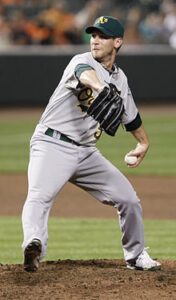
Craig Breslow – A Yale University graduate with a bachelor’s degree in molecular biophysics and chemistry, Breslow chose a career in baseball over one as a medical doctor. He had been admitted to New York University’s medical school. It was probably ego-deflating his first day as a Padre in 2005 when he was briefly mistaken for the batboy. Perhaps that was an omen. After splitting time between the Padres and its Triple-A minor league team, the Portland Beavers, he and the Padres parted company in December 2005. Breslau went on to play for seven other major league teams, some of them twice in non-consecutive seasons. While with the Oakland Athletics, he distinguished himself as a left-handed reliever, chalking up 71 strikeouts, setting a team record.
Breslow was nominated by the Boston Red Sox in 2013 and 2014 for baseball’s Roberto Clemente Award, which since 1971 has been conferred each year to the player who “best represents the game of baseball through extraordinary character, community involvement, philanthropy and positive contributions, both on and off the field.”
Retired as a player since 2018, Breslow has continued in baseball in the front office of the Chicago Cubs where, as of 2021, he was the assistant general manager and vice president for pitching.
Having celebrated in 1993 as a bar mitzvah at Congregation B’nai Israel in Bridgeport, Connecticut, and noted for having fasted on Yom Kippur even while pitching, Breslow pitched for the Israel team in the 2016 qualifying round for the 2017 World Baseball Classic.
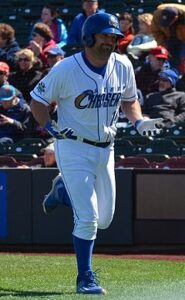
Cory Decker – Drafted by the San Diego Padres in 2009 after playing for UCLA, Decker spent seven seasons in the minor leagues for a total of 761 games before his MLB debut with the Padres at the end of the 2015 season. He had 11 at bats as a Padre and went hitless. Thereafter he became a free agent, playing in the organizations of six different teams until his retirement in 2019.
Decker played left field for Israel in the qualifying rounds of the 2013 World Baseball Classic, going only 1-10 in three games while scoring two runs batted in. He did much better as Israel’s third baseman in the 2017 qualifying rounds going 3 for 8, including a solo home run, over three games. Playing subsequently for Team Israel in Asia, Decker was perhaps best known in the series for bringing along a stuffed 5-foot-doll called “Mensch of the Bench,” which became the team’s mascot. Menschie, wearing a tallit, sat on the Israeli team’s bench at every game, and even had his own locker. In South Korea, Decker told the media: “He’s a mascot, he’s a friend, he’s a teammate, he’s a borderline deity to our team. … We even gave him offerings: Manischewitz, gelt, and gefilte fish.”
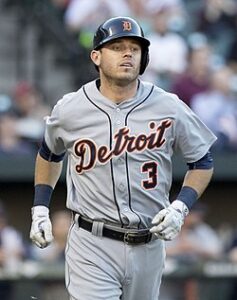
Ian Kinsler – The son of a Jewish father and Catholic mother, Kinsler was coached by his no-nonsense father while playing in the Pony League. When as a 13-year-old, Ian rolled his eyes while his father was giving instructions, Coach Howard Kinsler promptly benched his son, notwithstanding the fact that the team was in a championship game and Ian was the best player. The team lost but Ian learned an important lesson: don’t sass the coach.
After perfecting his baseball skills at Central Arizona College, Arizona State University and the University of Missouri, Kinsler spent three years in the minor leagues prior to his debut with the Texas Rangers on April 3, 2006, when his very first time as a batter, he got a hit off Curt Schilling of the Boston Red Sox. He later told The Sporting News: “The crowd was full; I had the butterflies going, so to get that hit was huge… To go out there and face one of the best pitchers of all time, you’ve got to be locked in. It’s your first game, your first big league experience—it was unbelievable to face that guy.” He continued to acquit himself well that premier year, batting .286 and leading American League rookies with 27 doubles.
Kinsler went on to a career in which he earned honors in every season.
In 2008, Kinsler joined the 20-20 club, hitting 20 homeruns and stealing 23 bases, and in 2008 he played in the All-Star game and landed a multimillion-dollar, five-year contract, telling ESPN: “I’m going to play the same regardless of whether I’m making $5 or $1 trillion. It really doesn’t make a difference to me. I’m going to go out there and play hard, and money doesn’t bring respect. The way you play the game brings respect. When I finish playing the game, it’s not how much money I made that is going to be my legacy; it’ how I played the game, and what I did on the field.” Notably, Kinsler was one of three Jewish players in that All-Star contest, the others being Kevin Youkilis of the Boston Red Sox and Ryan Braun of the Milwaukee Brewers. In June and July of that year, Kinsler compiled a 25-game hitting streak, and prior to a groin injury on August 17, he led the American League with a .331 batting average.
In 2009, he hit for the cycle (single, double, triple, and a home run in a single game) along with two additional hits for a total of six hits in a 9-inning game. He also became one of only 34 players in major league history to achieve a 30-30 record of home runs and stolen bases. Yet, Tampa Bay manager Joe Maddon declined to put Kinsler on that year’s All-Star game. However, he was designated as a reserve player for the 2010 All-Star Game, and in 2011, he once again hit the 30-30 mark, becoming the 12th major leaguer to perform the feat multiple times. In the 2012 season, he was an All-Star for the third time and in 2013 he reached a career total of 172 stolen bases, a Texas Rangers club record. Traded to the Detroit Tigers in late 2013 for prolific home run hitter Prince Fielder, Kinsler was selected in 2014 for the fourth time as an All-Star. He also won the Wilson Defensive Player of the Year Award for his second-place play. The award is based strictly on statistics. He won another honor for second base play in 2015 – the Fielding Bible Award, also based on statistical analysis. In 2016, he hit his 200th career home run, and the managers and coaches of the American League voted him the Gold Glove Award for Second Base play.
In 2017, Kinsler apparently forgot the lesson his father taught him about sassing: he was fined for saying that umpire Angel Hernandez “needs to find another job.” Although he hit 28 home runs that year, he had the lowest batting average of his career: .236. Also in 2017, Kinsler played for the Team USA in the 2017 World Baseball Classic, winning a gold medal as a member of the team. At the end of the year, the Tigers traded him to the Los Angeles Angels, where in 2018 he hit the 48th lead-off home run of his career. But he stayed with the Angels only three months, being traded to the Boston Red Sox in what proved a fortuitous move for Kinsler. With the Sox, he went on to win another Gold Glove award, and played in the 2018 World Series, in which Boston beat the Los Angeles Dodgers 4-1.
In 2019, Kinsler with an $8 million, two-year contract, joined the San Diego Padres, scoring his 1,999 career hit before a herniated disc in his neck forced him onto the disability list without reaching 2,000. In December, he announced his retirement as a player and his new career as a front office executive. The Padres named him as an adviser to baseball operations. In the off-season of 2020, Kinsler brushed up his baseball skills by playing with the Long Island Ducks in an independent league preparatory to joining Team Israel in the pandemic-delayed Tokyo Olympics in 2021. In the process, Kinsler became a dual citizen of the U.S. and Israel.
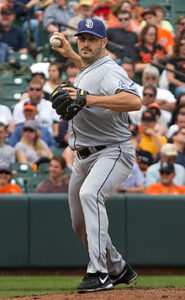
Jason Marquis – The grandson of Holocaust survivors, Marquis’ bar mitzvah in New York City was a mixture of Jewish tradition and baseball fandom. He read Torah at his Conservative congregation and celebrated at a reception for which his parents had replicated the scoreboard of the Little League World Series game in which he hurled a no-hitter for his South Shore team against a team from Canada. In 2004, Marquis got to compete in a World Series again, this time for the St. Louis Cardinals in a losing effort against the Boston Red Sox. Still, very few pitchers can claim to have competed in World Series both as a Little Leaguer and an MLB player.
At age 21, Marquis began his major league career with the Atlanta Braves in 2000, appearing in relief against the Toronto Blue Jays. In an interview with the Chicago Tribune, he commented on the exhilaration of being called from the bullpen to the pitcher’s mound for the first time: “I promise you, I didn’t feel my legs at all.” However, he wanted to be a starting pitcher, at one point requesting that the Braves send him down to the minors where he could be observed in that role by other baseball organizations. On one occasion, he pitched on Yom Kippur, attending minyan the following morning and reported late to the ballpark with the permission of Atlanta manager Bobby Cox.
At the end of 2003, he was traded to the St. Louis Cardinals, the second of ten major league clubs for whom he would play. In 2005, he pitched his first shutout, a two-hitter against the Washington Nationals. The following year, he got off to a promising start but then went into a pitching slump, ending up with a 14-16 record. While the Cardinals made it again to the World Series, Marquis didn’t get a chance to play, though he was given a World Series ring. At the end of 2006, he signed a three-year contract with the Chicago Cubs, and in 2007 tossed a 1-0 shutout against the Pittsburgh Pirates. Up to the 6th inning, it looked as if Marquis might have a perfect game to his credit, but a single by Don Kelly put that dream to rest. That same year, Marquis pitched a day game on September 20, which was Kol Nidre night. He went to Yom Kippur services the following day. “Baseball and religion fall into place, and I try not to make one more important than the other,” he commented.
In 2009, it was on to the Colorado Rockies, for whom he hurled an 86-pitch shutout against the Dodgers. He went on to represent the Rockies in the 2009 All-Star game, played in St. Louis, where as a former Cardinal, he won a strong ovation. In 2010 and part of 2011, he played for Washington Nationals, then for the Arizona Diamondbacks for the rest of 2011, and for the Minnesota Twins in 2012.
The San Diego Padres brought him aboard in 2012, and on June 18th he recorded his 1,000th Major League strikeout, against a fellow Jew, Ian Kinsler, then playing for the Texas Rangers. Marquis’ 2012 season ended with a broken wrist caused by a sharply hit ball to the pitcher’s mound. In 2013, he was healed well enough to win eight straight decisions, compiling a 9-5 record, before he tore a ligament in his right elbow, ending his season.
In 2014, Marquis played minor league ball in the Philadelphia Phillies organization, and in 2015, his last year in the MLB, he played for the Cincinnati Reds.
In 2017, Marquis pitched for Israel in the qualifying round of the World Baseball Classic, pitching four perfect innings with five strikeouts. In the main tournament in March 2017, he started three of the team’s first four games, all won by Israel. He pitched against South Korea, Cuba, and the Netherlands during the Classic.
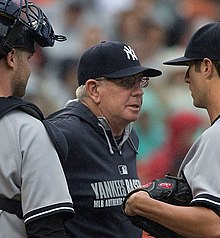
Larry Rothschild – In 1981 and 1982, Rothschild pitched for the Detroit Tigers, returning to baseball as a coach for the Cincinnati Reds from 1986 to 1993. He served as the bullpen coach in 1990 when the Reds beat the Oakland Athletics in the World Series. In 1994, he was a pitching instructor for the Atlanta Braves. From 1995 through 1997, he coached pitching for the Florida Marlins, who in 1997 defeated the Cleveland Indians in the World Series.
In 1998, Rothschild advanced to the position of manager of the Tampa Bay Devil Rays, continuing through 2001, when he was fired. His record with the Rays was 205-294.
It was back to coaching pitchers in 2002, staying with the Chicago Cubs until 2010 and then moving on to the New York Yankees from 2014 through 2019.
The San Diego Padres hired Rothschild as their pitching coach at the end of 2019, and he stayed in that position through the COVID-19 shortened 2020 season, and 2021, in which the Padres excelled in the first part of the season but dropped like a rock out of contention after the All-Star break. Along with manager Jayce Tingler and the rest of the Padres coaching staff, Rothschild was fired by the team’s owners.
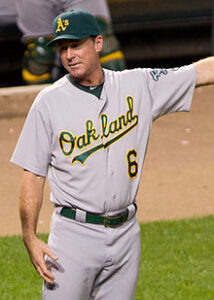
Bob Melvin — After the Padres fired Jayce Tingler and his coaching staff at the end of the disheartening 2021 season, the team convinced Bob Melvin to give up his job as manager of the Oakland A’s and to come south to San Diego for a three-year contract as the Padres manager.
Except for being an umpire, Melvin has done practically everything in baseball. Over ten years, he was a catcher for seven teams from 1985 through 1994. He began his career with the Detroit Tigers and moved on to the San Francisco Giants, Baltimore Orioles, Kansas City Royals, Boston Red Sox, New York Yankees and Chicago White Sox. He was praised for having a rifle shot arm, in 1987 catching 42.9 percent of opposing runners trying to steal second base.
When his playing days were over, the Milwaukee Brewers hired him to be a scout, then an instructor, and eventually an assistant to general manager Sal Bando. Next, he worked as a coach for the Brewers, the Tigers and the Arizona Diamondbacks before getting his first shot as a manager. He piloted the Seattle Mariners in 2003 and 2004, the Arizona Diamondbacks from 2005 to 2007, and the Oakland A’s from 2011 through 2021. Between his assignments with the Diamondbacks and the A’s, he worked as a scout for the New York Mets, and later accepted a role in the Diamondbacks front office.
He was honored as Manager of Year once by the National League for his work the Diamondbacks, and twice by the American League for his stewardship of the Oakland A’s. Only five other managers in history had won that award in both leagues, and only seven had been selected at least three times as a manager of the year. With over 10 years as the A’s manager, he was noted as the manager with the longest tenure with a single team.
 The son of a Jewish mother and a Catholic father, Melvin grew up in Palo Alto and played catcher for the Golden Bears at UC Berkeley, a team that finished third in the 1980 College World Series. Like Rothschild, he was raised in the Christian faith.
The son of a Jewish mother and a Catholic father, Melvin grew up in Palo Alto and played catcher for the Golden Bears at UC Berkeley, a team that finished third in the 1980 College World Series. Like Rothschild, he was raised in the Christian faith.
Next Sunday, May 22, 2022: Exit 15B (Pershing Drive): A Jewish tour of Balboa Park
This story is copyrighted (c) 2022 by Donald H. Harrison, editor emeritus of San Diego Jewish World. It is an updated serialization of his book Schlepping and Schmoozing Along Interstate 5, Volume 1, available on Amazon. Harrison may be contacted via donald.harrison@sdjewishworld.com
You’ve got the wrong Dave Roberts. The “Jewish” David Arthur Roberts was a pitcher who played for the Padres from 1969-71. David Wayne Roberts is the infielder/catcher who played for the Padres, and he appears to be a devout Christian based on New Testament bible verses included with his autographs.
David A. Roberts the pitcher had a Jewish father, but it appears he might not actually have identified as Jewish. His SABR biography references conversations with “his priest.” He is the most “suspicious” player still listed on our jewishbaseballmuseum.com website, but I don’t feel comfortable removing him yet.
Thank you, Bob. I apologize to both Roberts and to my readers. I have corrected the piece above per your important information — Don Harrison